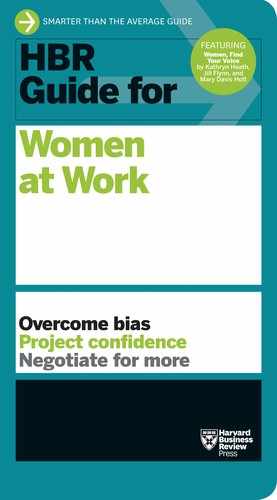CHAPTER 14
The Upside and Downside of Collaborative Leadership
by Jill Flynn, Kathryn Heath, and Mary Davis Holt
A few years ago we hosted a seminar for 150 businesswomen. The topic for the morning was “Power: Do Women Really Want It?” Just imagine the noise level when that many smart and engaged female managers debated the pros and cons of wielding power. As the session came to a close, we asked for a tally of how the breakout groups had answered the question. Their response was unanimous yet equivocal. Do women really want power? “Yes and no.”
Many of these women already held senior leadership positions in large companies. The others were in the room because they had been identified by their organizations as high potentials. Still, they could not fully come to terms with their ambition. One of the big reasons these women cited for their wishy-washy perspective? They strongly preferred to collaborate and cooperate rather than brazenly call the shots.
In our coaching sessions, we’ve worked with countless women who are exceptionally collaborative leaders. They have a talent for establishing buy-in. Still, the art of consensus can sometimes slow women down and diminish their leadership credibility. Over the past decade, we’ve interviewed more than 1,700 people to find out how women can be more successful at the highest levels in leadership. One thing we’ve heard again and again is that collaboration can be a double-edged sword in terms of being perceived as powerful.
It’s easy to make the case that collaborative leadership is the wave of the future: Technology makes decentralized decision making and flat organizations more feasible than ever. The problem is that an overemphasis on consensus can be viewed as weak. We’ve seen collaboration go wrong for women when they do the following three things:
Ask for permission
We teach children to ask for permission, but when that behavior occurs with regularity as an adult it is seen as overly deferential. Asking permission can be perceived as avoiding responsibility or an unwillingness to make tough decisions. Even beyond the negative perception it creates, a need for approval means you can’t act as quickly as other colleagues who are confident enough to proceed without hesitation. Leaders need to be willing to take risks and make difficult decisions independently.
Appear indecisive
There are plenty of instances when a decision requires careful consideration, conversation, and analysis. However, there are also many other times when you need to give yourself the green light to proceed. Making the tough calls on your own and getting closure quickly means you need to be comfortable delivering bad news or taking the opposing position. It’s acceptable to be the dissenter or to play the devil’s advocate as long as you have the ammunition to make a good case. If you can do so in a firm, non-emotional way, people will respect you for your decisiveness and expediency.
Fail to assert a strong point of view
Countless times we’ve seen well-meaning managers dilute their authority by failing to emphasize their perspective or corral an important discussion. Collaboration gone bad can mean your executive oversight and guiding perspective gets drowned out in the din. Suddenly, decisions are being made by committee. If you are not setting a clear agenda, considerable time and resources may be wasted in meetings and initiatives that are circuitous. The best collaborative leaders are able to maintain their executive presence: They articulate a vision, provide inspiration, and then give their teams enough latitude to creatively and effectively work toward a defined end that suits the organization.
Being a collaborative leader can be a tremendous asset when used judiciously. Women who can retain this core ability, while at the same time acting decisively to make things happen, will have the skills and demeanor to thrive.
__________
Jill Flynn is a partner at Flynn Heath Holt Leadership, which specializes in leadership development programs and executive coaching for women. She is a coauthor of Break Your Own Rules: How to Change the Patterns of Thinking That Block Women’s Paths to Power. Kathryn Heath is a partner at Flynn Heath Holt Leadership. She is a coauthor of The Influence Effect: A New Path to Power for Women. Mary Davis Holt, MBA, is a senior consultant with Flynn Heath Holt Leadership, and she is a coauthor of Break Your Own Rules: How to Change the Patterns of Thinking That Block Women’s Paths to Power. Follow them on Twitter @FlynnHeathHolt.
Adapted from “Collaboration’s Hidden Tax on Women’s Careers” on hbr.org, November 11, 2011
